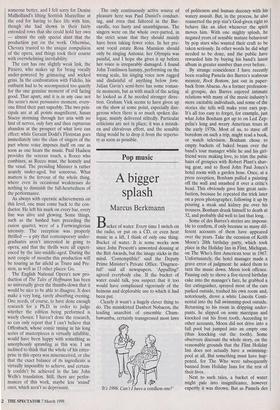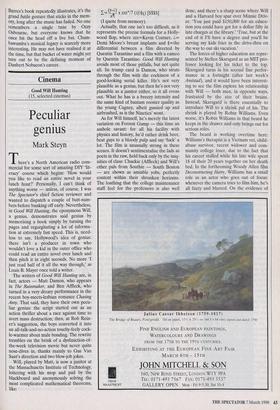Pop music
A bigger splash
Marcus Berkmann
Bucket of water. Every time I switch on the radio, or put on a CD, or even hear music in a lift, I think of only one thing. Bucket of water. It is some weeks now since John Prescott's unwonted dousing at the Brit Awards, but the image sticks in the mind. 'Contemptible!' said the Deputy Prime Minister's Private Office. 'Disgrace- ful!' said all newspapers. 'Appalling!' agreed everybody else. If the bucket of water could talk, you suspect that it too would have complained vigorously of the heinous and deplorable use to which it had been put.
Clearly it wasn't a hugely clever thing to do. The miniskirted Danbert Nobacon, the leading anarchist of ensemble Chum- bawumba, certainly transgressed most laws It's 1998. Can't I have a cordless one?' of politeness and human decency with his watery assault. But, in the process, he also reasserted the pop star's God-given right to behave like an idiot whenever the spirit moves him. With one mighty splosh, he negated years of sensible mature behaviour by pop stars who wanted their craft to be taken seriously. In other words he did wh4t needed to be done, and the public have rewarded him by buying his band's latest album in greater number than ever before.
By strange coincidence I have recently been reading Pamela des Barres's scabrous memoir, Rock Bottom, just out in paper- back from Abacus. As a former profession- al groupie, des Barres enjoyed intimate relations with many of the music industry's more excitable individuals, and some of the stories she tells will make your ears pop. It's all too easy to forget, for example, just what John Bonham got up to on Led Zep- pelin's long and weary American tours in the early 1970s. Most of us, to stave off boredom on such a trip, might read a book, or watch television. Bonham chose to empty buckets of baked beans over the band's tour manager while he and his girl- friend were making love, to trim the pubic hairs of groupies with Robert Plant's shav- ing gear, and to flood John Paul Jones's hotel room with a garden hose. Once, at a press reception, Bonham pulled a painting off the wall and smashed it over a critic's head. This obviously gave him great satis- faction, because he repeated the trick later on a press photographer, following it up by pouring a steak and kidney pie over his trousers. Bonham drank himself to death at 32, and probably did well to last that long.
Some of des Barres's stories are impossi- ble to confirm, if only because so many dif- ferent accounts of them have appeared over the years. Take the occasion of Keith Moon's 20th birthday party, which took place in the Holiday Inn in Flint, Michigan, on The Who's first American tour in 1967. Unfortunately, the hotel manager made a grave error of judgment: he asked them to turn the music down. Moon took offence. Pausing only to shove a five-tiered birthday cake into the manager's face, he grabbed a fire extinguisher, sprayed most of the cars parked outside, trashed his own room and, notoriously, drove a white Lincoln Conti- nental into the full swimming-pool outside. Returning to his room in dripping under- pants, he slipped on some marzipan and knocked out his front tooth. According to other accounts, Moon did not drive into a full pool but jumped into an empty one (thus knocking out the tooth). Some observers discount the whole story, on the reasonable grounds that the Flint Holiday Inn does not actually have a swimming- pool at all. But something must have hap- pened, for The Who were subsequently banned from Holiday Inns for the rest of their lives.
Next to such tales, a bucket of water might pale into insignificance, however expertly it was thrown. But as Pamela des Barres's book repeatedly illustrates, it's the grand futile gesture that sticks in the mem- ory, long after the music has faded. No one remembers a single tune by Ozzy Osbourne, but everyone knows that he once bit the head off a live bat. Chum- bawumba's musical legacy is scarcely more Interesting. He may not have realised it at the time, but that bucket of water might yet turn out to be the defining moment of Danbert Nobacon's career.



























































 Previous page
Previous page